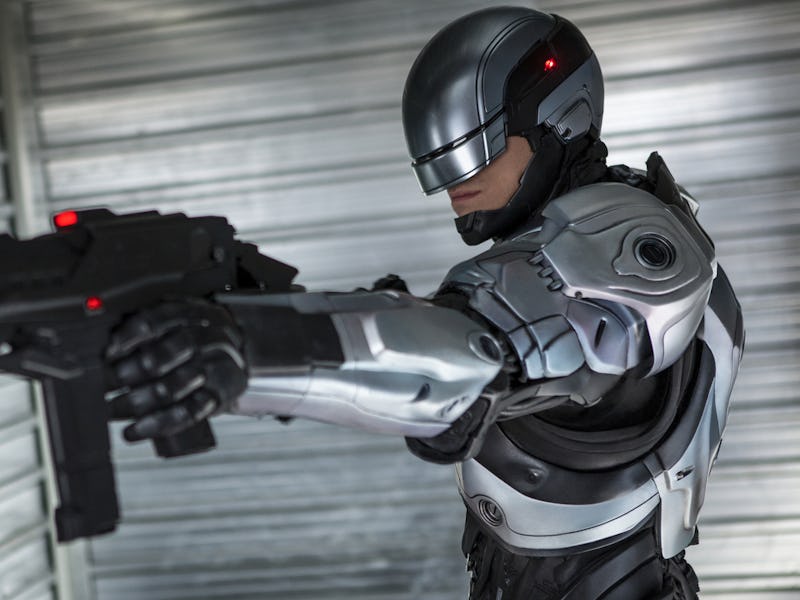One Underrated Sci-Fi Movie Proved Not All ‘80s Reboots Are Devoid of Imagination
The 2014 Robocop is not as bad as its reputation suggests.

The early 2010s slate of action movies suggested certain Hollywood execs had a deep nostalgia for the fledgling days of Blockbuster. But the likes of Red Dawn, Total Recall and The A-Team were just some of the macho men remakes which proved what worked in the VHS era didn’t necessarily work in the modern day. However, by recognizing the need for change while still retaining the original’s spirit, the reboot of Paul Verhoeven’s 1987 sci-fi satire RoboCop was fully worth any rental fee.
Celebrating its 10th anniversary this month, the story of a critically injured cop remodeled into a half-man, half-machine had been in the pipeline long before the gung-ho actioner enjoyed a revival. In 2008, the same year he brought another ‘80s relic, Mickey Rourke, back from the wilderness, The Wrestler director Darren Aronofsky signed up to helm the project. But after various scheduling and creative conflicts, José Padilha was given the opportunity to make his English-language debut instead. It proved to be something of a poisoned chalice.
Indeed, the Brazilian soon discovered the pitfalls of working within the Tinseltown system. “It's hell here,” he reportedly told Oscar-nominated countryman Fernando Meirelles during the RoboCop shoot. “The film will be good, but I have never suffered so much and I don't want to do it again.” He was half-right. Padilha did work with another major studio once more on 2018 counter-terrorism tale 7 Days in Entebbe. Yet his confidence about the finished product wasn’t misplaced.
Having made his name with Elite Squad, a slightly more grounded tale of police brutality set in the favelas of Rio, Padilha was the ideal man to give RoboCop a grittier makeover. He certainly knows how to stage a high-octane set-piece, with the opening scene, a propaganda live news report about the effectiveness of military androids which goes horribly wrong, perfectly setting the kinetic tone.
And although his near-future world building isn’t as unsettling as the original’s more radical dystopia, the movie’s striking imagery still boasts the ability to shock: see when Joel Kinnaman’s titular hero discovers his head, heart and right hand are his only remaining human components, or the climatic scene in which his fully-formed robotic self single-handedly manages to fend off an army of gun-toting, supersized automatons.
It’s not just in the visuals where the 2014 version of RoboCop justifies its existence, though. Without disrespecting the likes of Kurtwood Smith and Miguel Ferrer, the casting here is undoubtedly on another level. There are two Oscar winners, for one thing (and a further three Oscar nominees), with Gary Oldman playing Dr. Dennett Norton, the scientist-with-a-conscience responsible for blurring the boundaries between man and machine, and Samuel L. Jackson stealing the show as Pat Novak, a Fox News-esque talk show host whose vocal support for mechanized crime fighting becomes increasingly unhinged.
Samuel L. Jackson almost making Tucker Carlson appear the height of restraint.
Elsewhere, Michael Keaton brings the right amount of villainous smarm as OmniCorp CEO Raymond Sellars, a man determined to railroad America into accepting cyborg cops as a permanent fixture on its streets, no matter the human cost. Last, but not least, Jackie Earle Haley oozes pure malevolence as the military technician tasked with transforming RoboCop into the ultimate weapon.
With his less cumbersome metallic suit also now armed with a retractable visor, Kinnaman’s Alex can be far more expressive than Peter Weller’s, something which the film capitalizes on by heightening the family drama. Indeed, while the first RoboCop’s wife and son were little more than minor footnotes, Clara (Abbie Cornish) and David Murphy (John Paul Ruttan) are integral to the storyline here, the former reluctantly giving the go-ahead to turn her husband into the Detroit criminal underworld’s worst nightmare and the latter’s trauma essentially reawakening Alex’s fatherly instincts.
Gary Oldman’s scientist and his Frankenstein-like creation.
While RoboCop may be more earnest than Verhoeven’s straight shooter, it still has plenty of fun skewering everything from American jingoism and right-wing news organizations to the manipulative powers of PR — Jay Baruchel is particularly entertaining as OmniCorp’s shameless head of marketing. There’s also an inspired sequence in which Murphy is put back together to the sound of “If I Only Had A Heart,” with Sellars’ disparaging “Tin Man” insult furthering The Wizard of Oz connection. And Kinnaman is afforded the odd zinger, too. “No, it’s nothing personal,” he dryly insists to the corrupt police officer behind the car bomb that left him paralyzed, blind and at the mercy of a highly unethical warfare manufacturer. “Although I don’t like you as a person.”
Of course, those who grew up watching the source material may balk at how the film tones down all the sex, drugs and violence. In fact, only the latter here really gets a look-in, and even that is strictly of the PG-13 variety rather than the R-rated. That’s something which no doubt accounts for the middling box office (($243 million on a $130 million budget). But in a period when dark superhero movies seemed designed solely for the minds of hormonal teenage boys, it was refreshing to see a preference for emotional intelligence — even the android’s powers are determined by his mental wellbeing — over bloodshed and bare breasts.